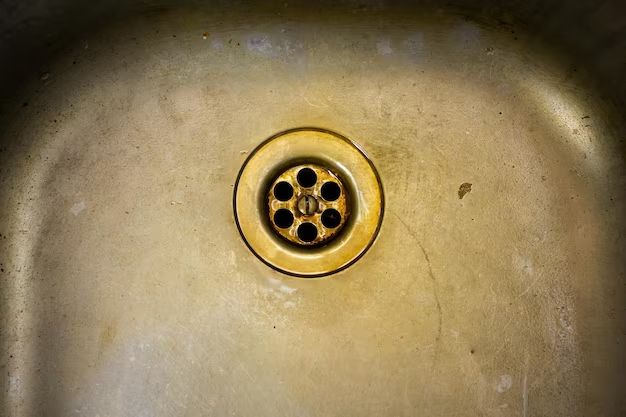Rust formation is a common problem in bathrooms due to the high humidity and exposure to water. Some metals are more prone to rusting than others when used in bathroom fixtures, tiles, pipes, and accessories. Choosing the right materials is crucial to prevent rust from developing and damaging your bathroom over time.
Page Contents
What Causes Rust in the Bathroom?
Rust is an oxidized form of iron that occurs when iron or iron-containing metals are exposed to oxygen and moisture. The humid, damp conditions in bathrooms provide ideal conditions for rust to form.
Common causes of rust in bathrooms include:
- Metal pipes and fixtures with iron content
- Poor ventilation leading to condensation buildup
- Water leaks from showers, tubs, and sinks
- Iron particles in water supplies
- Prolonged exposure to humidity and steam from baths and showers
Even small amounts of moisture from splashes and condensation can start the rusting process over time. Iron, steel, and iron alloys are most likely to rust, while other metals like aluminum, brass, and stainless steel have higher rust resistance.
Metals That Do Not Rust in Bathrooms
To avoid rust issues, the best metals to use in bathrooms are those with high corrosion resistance. Some popular rust-resistant metals include:
Stainless Steel
Stainless steel contains iron along with 10% or more chromium content. The chromium forms an invisible passive layer on the steel’s surface that acts as a shield against corrosion. Stainless steel has excellent resistance to rust and is commonly used for:
- Showers, tubs, and sinks
- Faucets and plumbing fixtures
- Towel bars, shelves, and other accessories
Grade 304 stainless steel is most popular for bathroom uses. Stainless can still rust if the passive layer is damaged, so care should be taken to keep it free of scrapes and cleaning chemical residue.
Aluminum
Aluminum bathroom accessories, tiles, and panels will not rust because aluminum does not contain iron. Anodized aluminum offers even better corrosion resistance by having a controlled oxidation layer added to its surface. Common bathroom uses include:
- Shower walls, doors, and trim
- Mirror frames
- Tiles and panels
- Ventilation fans
Aluminum can be prone to other types of corrosion but will not specifically rust. It is a lightweight, durable, and attractive rust-free option.
Brass
Brass is an alloy of copper and zinc that does not contain iron. Its corrosion-resistant properties make brass a popular choice for bathroom fixtures and accessories, including:
- Faucets and showerheads
- Interior door knobs and handles
- Hooks, towel rods, and robe hooks
- Drains and supply lines
Brass has excellent resistance to damage from moisture and chemicals. Unlacquered brass may develop a patina over time but will not rust. Polished brass has a bright, golden look when new.
Nickel
Pure nickel and nickel alloys like monel are highly resistant to rust and corrosion. Nickel bathroom accessories include:
- Faucets
- Sinks
- Showerheads and plumbing fittings
Nickel plating is also frequently used to coat iron or steel fixtures and provide corrosion protection while retaining a shiny, chrome-like appearance.
Bronze
With its copper content and lack of iron, bronze will not rust in bathroom conditions. Bronze is often used for:
- Towel racks, hooks, and bars
- Toilet paper holders and grab bars
- Soap dishes
- Switch plates and shower accessories
Oil-rubbed bronze finishes have an antique aged look. Bronze may slowly develop a patina but will not rust through.
Preventing Rust in Bathrooms
While stainless steel, aluminum, brass, nickel, and bronze do not rust, iron-based metals can still cause problems in bathrooms. Follow these tips to prevent rust from occurring:
- Use high-quality stainless steel or enameled cast iron for tubs and sinks instead of unprotected iron.
- Choose metal bathroom accessories made from rust-proof materials.
- Install bathroom exhaust fans and open windows to reduce humidity.
- Quickly repair any water leaks and wipe up puddles.
- Clean products immediately after use to avoid residue buildup.
- Check for signs of rust regularly and clean at first appearance.
- Avoid iron or steel for products directly exposed to moisture.
- Use rust-resistant coatings on iron pipes, drains, and fixtures.
Removing Existing Rust
If you already have rust stains in your bathroom, it can be removed without replacing everything. Methods to remove rust include:
- Baking soda or other abrasive cleaners to scrub off surface rust.
- Vinegar or citric acid solutions to dissolve rust, followed by rinsing.
- Chemical rust removers like phosphoric or oxalic acid.
- Sandpaper or steel wool to sand down larger rust spots.
- Re-enameling rusted surfaces like iron tubs and sinks.
For severe rust, replacement of the affected parts may be needed. Getting rid of moisture sources and switching to rust-resistant materials will help keep it from returning.
Conclusion
Rust formation can be a nuisance in bathrooms due to the presence of water, condensation, and humidity. Stainless steel, aluminum, brass, nickel, and bronze do not contain iron so they will not rust. Iron-based metals can be protected by prompt cleaning, moisture reduction, and surface treatments. With the right combination of rust-resistant materials and proper care, you can enjoy a bathroom free of ugly, damaging rust.
